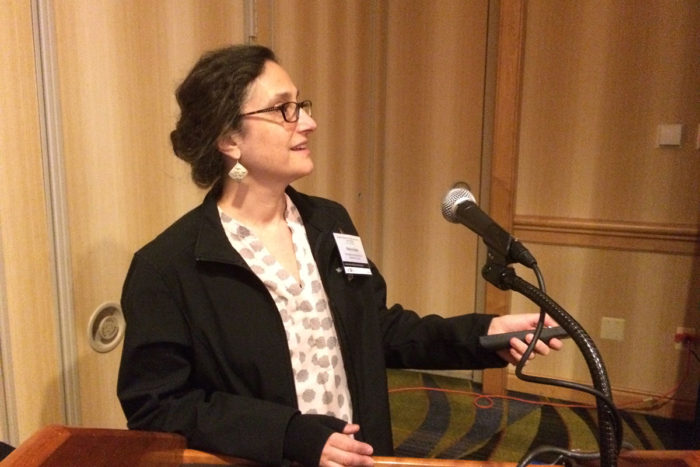Study: Accomplished female scientists often overlooked
Conference organizers invite male speakers over equally qualified women
 Daved Fremont
Daved FremontRobyn Klein, MD, PhD, speaks Wednesday, April 19, at a National Institute of Allergy and Infectious Diseases annual meeting. Klein authored a study published this week that showed that accomplished female scientists often are overlooked as speakers at scientific conferences, even when they have strong track records of being published in high-impact journals.
Invited speakers at neuroimmunology conferences in 2016 were disproportionately male, and not because male scientists were producing higher quality work, according to a new study. Instead, qualified female scientists were overlooked by organizing committees. Robyn Klein, MD, PhD, a professor of medicine, of neuroscience, and of pathology and immunology at Washington University School of Medicine in St. Louis, discussed the findings, published online April 18 in Nature Immunology.
Why did you start investigating this issue?
A postdoctoral fellow in my lab pointed out that the preliminary speaker list for an international neuroimmunology conference included only 13 female speakers out of 85 total. I contacted the conference organizers, and they responded that there weren’t enough accomplished female neuroscientists at senior ranks to invite. So I thought, “That’s a hypothesis that I can test.”
How did you test the hypothesis that there is a larger pool of accomplished men than women in neuroimmunology?
I began by assembling an ad hoc committee of neuroimmunologists and asked them to send me the names of women neuroimmunologists who would be good speakers at an international meeting. After receiving 29 names – the number that would achieve gender balance for the meeting – I analyzed the number of publications in relatively high-impact journals in the last two years for each of the invited speakers as well as my list of female scientists. I found that while there was no gender difference among the investigators with the very highest impact publications, there were many more women with papers in the next tier of journals compared with men. Importantly, 21 percent of the men had no publications that met my criteria in the past two years, compared with only 5 percent of the women. So I concluded that the hypothesis was not correct; there were plenty of women who had published high-impact papers recently who could have been invited and would have improved the scientific impact of the meeting.
Why does this problem exist?
I learned two things while doing this study. One, the composition of the organizing committee matters. I looked at all the neuroimmunology conferences held in 2016 worldwide, and I found that as you approach 50 percent women on the organizing committee, you approach 50 percent female invited speakers. So if you want gender parity in speakers, first you need to include more women in organizing and planning committees. Two, speaking out about gender balance makes a difference. The organizers of the first conference asked for my list of overlooked female neuroimmunologists and invited several of them. They ended up doubling the number of female speakers at their conference, and that raised the quality of the conference. The speaker list was much stronger once they included more women. But it would not have been improved if we hadn’t spoken out. It’s important to notice if people are being overlooked because of unconscious bias and to bring that to the attention of others who are seeking speakers, and leaders. This also is required to combat bias due to race, ethnicity, and nationality. Naming the problem is the first step in solving it.
How do your findings fit into the larger question of gender bias in the sciences?
There’s a growing body of research showing that female scientists’ contributions to their fields are often not reflected in the number of speaker invitations they receive, and that this under-recognition hurts their careers and slows the pace of scientific progress. While this bias may be unconscious, data from sources such as BiasWatchNeuro – founded in 2015 to track the proportion of female conference speakers relative to the proportion of female faculty in the relevant field – show that it is widespread. Encouragingly, the data also show that bringing such biases to light helps to reduce their impact.







